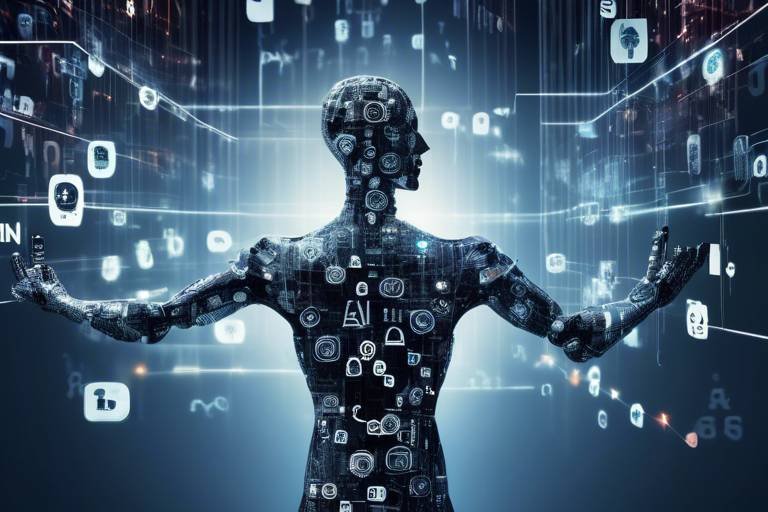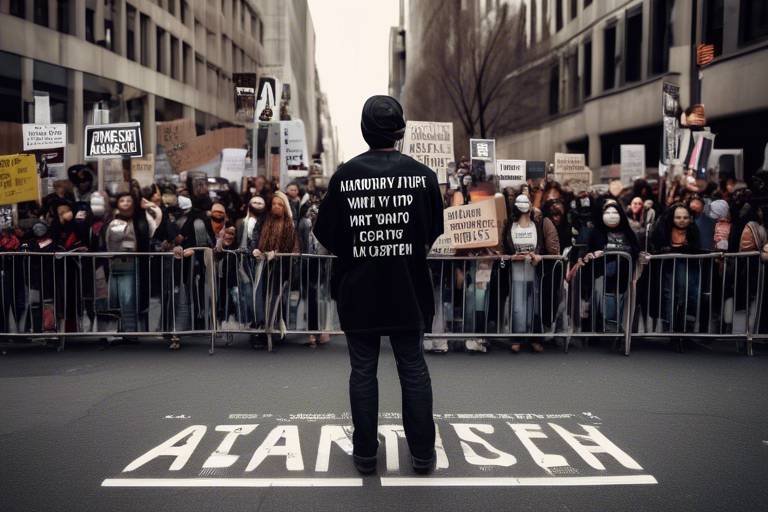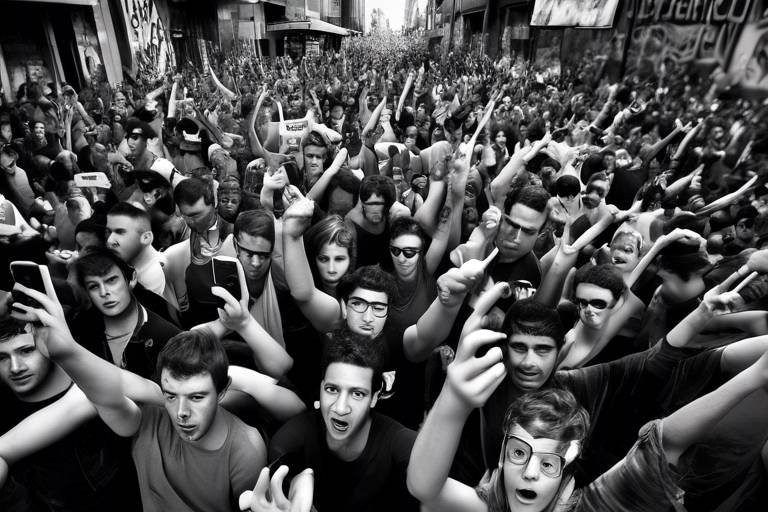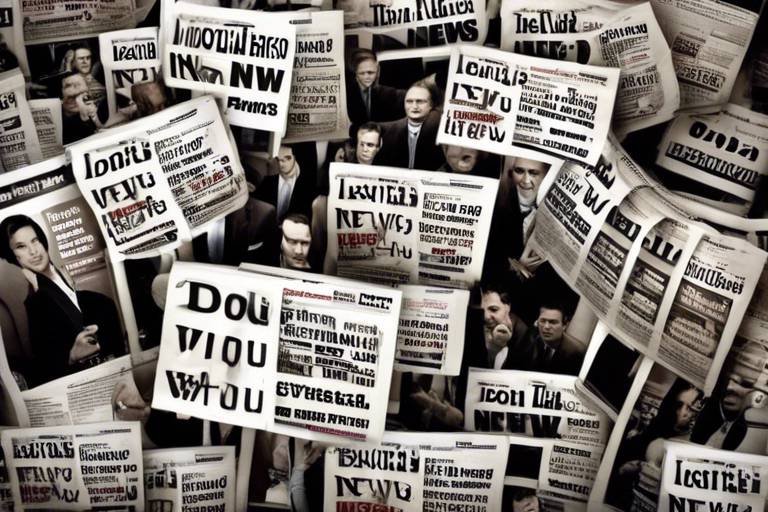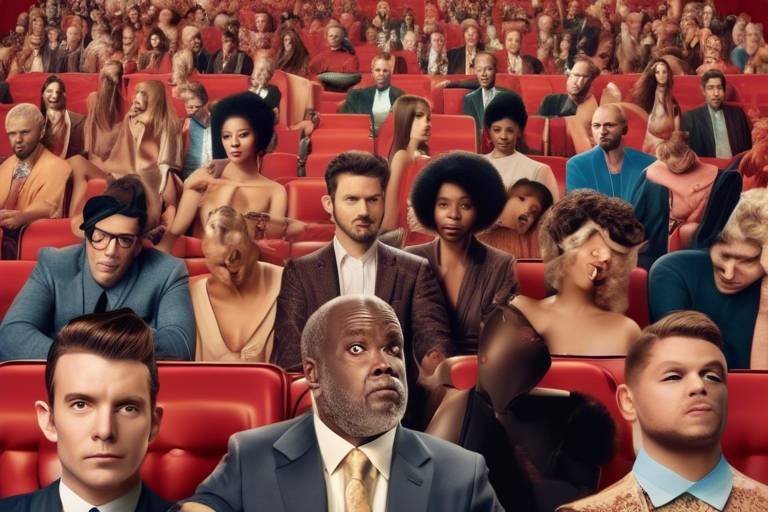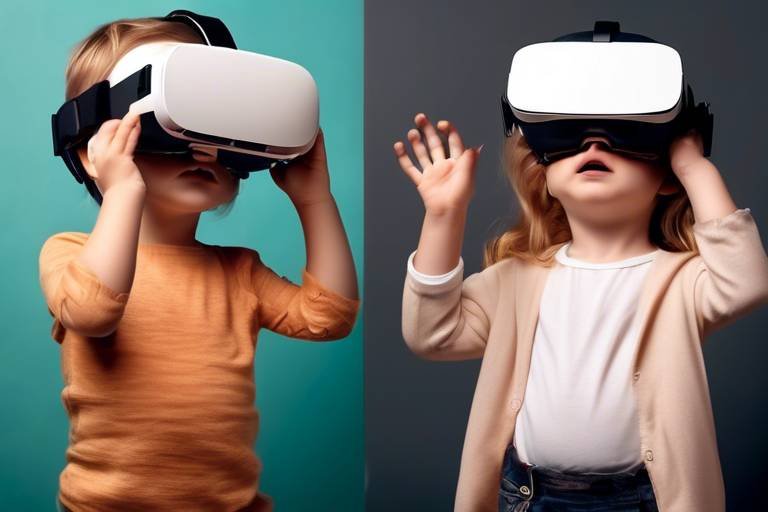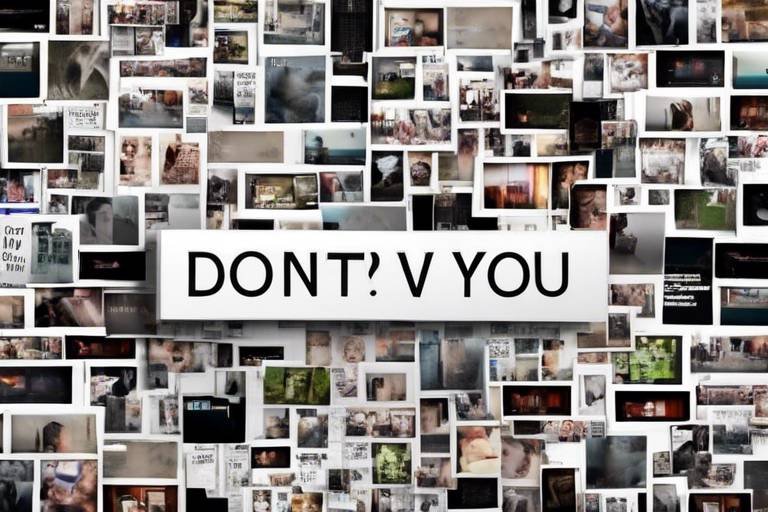How Social Media Influences Perceptions of Reality
In today’s fast-paced digital age, social media platforms have become more than just a means of communication; they are shaping our perceptions of reality in profound ways. Imagine scrolling through your feed, where every post seems to present a perfect life, a flawless body, or an enviable career. It’s like stepping into a curated gallery of someone else’s life, but what happens when that gallery starts to influence how you see yourself and the world around you? This article dives deep into the multifaceted impact of social media on our understanding of reality, exploring the psychological, social, and cultural implications of digital interactions in contemporary society.
Have you ever wondered why you see certain posts over others? The answer lies in the intricate world of algorithms. These powerful tools determine what content is visible to users, essentially curating our online experiences. By analyzing our interactions, preferences, and behaviors, algorithms prioritize content that aligns with our interests. While this might seem convenient, it can significantly skew our perceptions. For instance, if we predominantly engage with posts that reflect a particular viewpoint, we may unknowingly limit our exposure to diverse perspectives. Understanding how these algorithms function is crucial for recognizing their impact on our worldview. They don’t just show us what we want to see; they shape our beliefs and attitudes, often without us even realizing it.
As we navigate the digital landscape, we often find ourselves in echo chambers and filter bubbles—environments where our beliefs are reinforced by the content we consume. Picture this: you’re in a room filled with people who share your opinions, and every conversation only echoes what you already believe. This phenomenon can skew our perceptions and limit exposure to diverse viewpoints, creating a false sense of consensus. The danger here is that it can lead to polarization, where differing opinions are dismissed, and critical discussions are stifled. The result? A distorted view of reality where only certain narratives thrive, leaving little room for healthy debate and understanding.
The psychological impact of social media is profound, often leading to altered perceptions of reality. Increased anxiety and distorted self-image are just a couple of the consequences that many users face. As we scroll through idealized images and highlight reels, it’s easy to fall into the trap of comparison. We start to measure our worth against these curated portrayals, which can lead to feelings of inadequacy. It’s essential to understand these effects to navigate the digital landscape healthily. By acknowledging how social media influences our mental state, we can take proactive steps to mitigate its impact.
One key concept to consider is Social Comparison Theory, which explains how individuals evaluate themselves based on others’ social media portrayals. When we see friends or influencers showcasing their best moments, we might subconsciously set unrealistic standards for ourselves. This constant comparison can affect self-esteem and overall mental health. It’s like trying to measure up to a constantly moving target—one that’s often unattainable. The pressure to appear perfect online can lead to a vicious cycle of dissatisfaction and anxiety.
Moreover, the fear of missing out (FOMO) is a pervasive issue exacerbated by social media. As we witness others enjoying life’s highlights, it can lead to heightened anxiety and dissatisfaction with our own experiences. It’s as if social media has created a stage where everyone else is performing, and we’re sitting in the audience, feeling left out. This phenomenon significantly influences how reality is perceived among users, often distorting our sense of fulfillment and happiness.
Social media doesn’t just affect our self-perception; it reshapes interpersonal relationships as well. The ways we communicate and connect with others have evolved dramatically, often leading to misunderstandings and altered perceptions of social dynamics. For instance, a simple text message can be interpreted in numerous ways, leading to confusion and conflict. Additionally, the constant connectivity can create unrealistic expectations regarding availability and responsiveness. Exploring these changes helps us understand the broader implications for social connectivity and the quality of our relationships.
In an age where information is at our fingertips, the spread of fake news on social media platforms distorts perceptions of reality. Misinformation can lead to confusion and mistrust among users, making it challenging to discern fact from fiction. Addressing this issue is vital for fostering informed communities in the digital age. When we consume information without critical evaluation, we risk adopting false beliefs that can shape our understanding of the world.
Developing critical thinking skills is essential for navigating the vast amount of information on social media. This ability helps users discern credible sources and form a more accurate understanding of reality. By questioning the information we encounter and seeking out diverse viewpoints, we can break free from the confines of echo chambers and filter bubbles. It’s about empowering ourselves to think critically and engage thoughtfully with the content we consume.
Lastly, media literacy education equips individuals with the tools to analyze and evaluate social media content critically. This education is crucial for fostering responsible consumption of information and shaping perceptions. By understanding the mechanics of social media and the implications of our digital interactions, we can cultivate a healthier relationship with technology and enhance our overall well-being.
- How does social media affect mental health? Social media can lead to increased anxiety, distorted self-image, and feelings of inadequacy due to constant comparison and exposure to idealized portrayals of life.
- What are echo chambers? Echo chambers are environments where individuals are exposed primarily to information that reinforces their existing beliefs, limiting exposure to diverse perspectives.
- Why is media literacy important? Media literacy helps individuals critically evaluate information, discern credible sources, and navigate the digital landscape responsibly, fostering informed communities.

The Role of Algorithms
The digital landscape we navigate today is largely shaped by algorithms. These complex mathematical formulas determine what content appears on our social media feeds and, in turn, influence our perceptions of reality. Imagine algorithms as invisible curators, selecting which pieces of information are worthy of our attention and which are left in the shadows. This process is not random; it’s designed to keep us engaged, often leading us down a rabbit hole of content that aligns with our interests and beliefs.
To grasp the significance of algorithms, it’s essential to understand their operational mechanisms. They analyze our interactions—likes, shares, comments, and even the time we spend on specific posts—to curate content that resonates with us. This tailored experience can create a sense of connection, but it also risks narrowing our perspectives. For instance, if you frequently engage with posts about fitness, the algorithm will prioritize similar content, potentially overshadowing diverse viewpoints on health and wellness. This phenomenon can lead to a skewed understanding of reality, where we only see a fraction of the world that aligns with our preferences.
Moreover, the implications of algorithm-driven content extend beyond personal preferences. They play a pivotal role in shaping societal narratives. When certain topics trend due to algorithmic promotion, they can dominate discussions, overshadowing critical issues that may require our attention. This creates a cycle where the loudest voices are amplified while quieter, yet equally important, perspectives are drowned out. Understanding this dynamic is crucial for anyone looking to navigate the complexities of social media effectively.
In summary, algorithms are powerful tools that significantly influence our online experiences. Recognizing their role in shaping our perceptions can empower us to approach social media with a critical eye. By questioning what we see and seeking out diverse sources of information, we can break free from the confines of algorithmic curation and develop a more holistic understanding of reality.

Echo Chambers and Filter Bubbles
In the vast landscape of social media, echo chambers and filter bubbles have become defining features that significantly shape our perceptions of reality. But what exactly do these terms mean? An echo chamber is an environment where a person only encounters information or opinions that reflect and reinforce their own beliefs. In contrast, a filter bubble refers to the personalized algorithmic filtering that social media platforms use to curate content for users, often isolating them from diverse perspectives. Together, these phenomena create a digital space where critical thinking can be stifled, and genuine understanding becomes increasingly elusive.
Imagine walking into a room filled with mirrors, where every reflection only shows the version of you that you want to see. This is akin to how echo chambers function in our social media interactions. When users engage primarily with like-minded individuals or content that aligns with their views, they may become unaware of alternative perspectives. This lack of exposure can lead to a distorted sense of reality, where dissenting opinions are not just ignored but actively dismissed. Consequently, the world outside this bubble can seem alien and threatening, fostering division rather than dialogue.
Moreover, the role of algorithms in creating filter bubbles cannot be overstated. Social media platforms utilize complex algorithms to determine what content appears in a user's feed. These algorithms analyze user behavior, such as likes, shares, and comments, to curate a personalized experience. While this can enhance user engagement, it also means that users are often shielded from viewpoints that challenge their beliefs. As a result, individuals may find themselves trapped in a cycle of confirmation bias, where they seek out only information that validates their existing opinions.
The implications of echo chambers and filter bubbles extend beyond individual users; they also impact society at large. When groups of people are consistently exposed to the same ideas, the potential for polarization increases. This polarization can lead to societal fragmentation, where different groups become more entrenched in their beliefs and less willing to engage in constructive conversations. The digital landscape can thus become a battleground of ideas, where understanding and empathy take a backseat to conflict and division.
To illustrate the effects of echo chambers and filter bubbles, consider the following table:
| Aspect | Echo Chambers | Filter Bubbles |
|---|---|---|
| Definition | Environment reinforcing existing beliefs | Personalized content filtering by algorithms |
| Impact on User | Isolation from opposing views | Lack of diverse information exposure |
| Societal Implication | Increased polarization | Fragmented public discourse |
Understanding the dynamics of echo chambers and filter bubbles is crucial for anyone navigating the digital world. By recognizing how these constructs operate, individuals can take proactive steps to seek out diverse viewpoints and challenge their assumptions. Engaging with a variety of sources, questioning the information presented, and fostering open discussions can help break down the walls of isolation that these phenomena create. After all, true understanding often lies beyond the confines of our own echo chambers.
- What are echo chambers? Echo chambers are environments where individuals only encounter information that reinforces their existing beliefs, limiting exposure to differing viewpoints.
- How do filter bubbles work? Filter bubbles are created by algorithms that personalize content for users based on their past behavior, often isolating them from diverse perspectives.
- What are the consequences of living in an echo chamber? Living in an echo chamber can lead to polarization, misunderstanding, and a distorted perception of reality.
- How can I avoid falling into an echo chamber? To avoid echo chambers, actively seek out diverse opinions, engage in discussions with people who have different views, and critically evaluate the information you consume.

The Psychological Effects
Social media has become an integral part of our daily lives, but its psychological effects can be profound and often unsettling. As we scroll through our feeds, we are bombarded with curated images and stories that can distort our perceptions of reality. For many, this constant exposure leads to feelings of inadequacy and anxiety. Imagine walking through a gallery filled with stunning portraits, each one showcasing a life that seems more vibrant and fulfilling than your own. This is the essence of social media; it’s a highlight reel that can make anyone feel like they’re missing out on something extraordinary.
The phenomenon known as social comparison theory plays a significant role in this psychological landscape. When we compare ourselves to others, especially those who appear to be living their best lives online, it can lead to unrealistic standards. We may find ourselves asking, “Why can’t I have that?” or “What am I doing wrong?” This constant comparison can chip away at our self-esteem, leaving us feeling less than adequate. It’s like trying to measure your worth against a never-ending stream of perfection, where the only outcome is disappointment.
Moreover, the fear of missing out, or FOMO, is another psychological effect that has gained traction in the age of social media. As we see friends attending events, enjoying vacations, or achieving milestones, it can create a sense of urgency to be part of those moments. This fear can lead to heightened anxiety and dissatisfaction with our own lives. According to a study by the Journal of Social and Clinical Psychology, individuals who frequently engage with social media are more likely to experience feelings of loneliness and depression. It’s a paradox; the more connected we are, the more isolated we can feel.
To illustrate the impact of these psychological effects, consider the following table that outlines common emotional responses to social media interaction:
| Emotional Response | Description |
|---|---|
| Inadequacy | Feeling insufficient compared to others’ portrayals. |
| Anxiety | Worrying about missing out on experiences. |
| Loneliness | Feeling disconnected despite being online. |
| Depression | Experiencing sadness due to unfavorable comparisons. |
These psychological effects highlight the importance of understanding how social media influences our mental well-being. It’s crucial to recognize that while social media can be a tool for connection, it can also warp our perceptions if we’re not careful. By taking breaks, curating our feeds, and focusing on real-life interactions, we can mitigate some of these negative effects. Just as we wouldn’t drink from a polluted stream, we must be mindful of the information we consume and how it shapes our reality.
In conclusion, the psychological effects of social media are complex and multifaceted. They can lead to feelings of inadequacy, anxiety, and even depression. However, by fostering awareness and critical thinking, we can navigate this digital landscape more healthily and maintain a more balanced perspective on our lives and the lives of others.
- How can social media impact mental health? Social media can lead to feelings of inadequacy, anxiety, and depression, especially through social comparison and FOMO.
- What is social comparison theory? It’s a psychological concept that explains how individuals evaluate themselves based on the perceived success and happiness of others, often leading to negative self-perception.
- What can I do to reduce anxiety from social media? Consider taking breaks from social media, curating your feed to include positive influences, and focusing on real-life interactions.

Social Comparison Theory
Social comparison theory is a fascinating concept that dives deep into how we evaluate ourselves based on the lives we see portrayed on social media. Imagine scrolling through your feed and seeing friends on exotic vacations, showcasing their dream homes, or flaunting their latest accomplishments. It’s like a highlight reel of everyone’s best moments, and while it can be inspiring, it can also lead to a distorted view of reality. This constant comparison can create a toxic cycle where we measure our worth against the curated lives of others, often leading to feelings of inadequacy and dissatisfaction.
When we engage with social media, we often find ourselves caught in a whirlwind of emotions. Have you ever felt a twinge of envy or self-doubt after seeing a friend's post? This is where social comparison theory comes into play. It suggests that we have an innate drive to assess our own abilities and opinions by comparing ourselves to others. In the digital age, these comparisons are amplified, as platforms like Instagram and Facebook present an endless stream of idealized images and lifestyles. The result? A skewed perception of what a “normal” life looks like.
To illustrate this point, consider the following table that highlights some common outcomes of social comparison on social media:
| Type of Comparison | Possible Outcomes |
|---|---|
| Upward Comparison | Feelings of inadequacy, lower self-esteem, motivation to improve |
| Downward Comparison | Boost in self-esteem, feelings of superiority, complacency |
| Peer Comparison | Mixed feelings, validation from peers, but also pressure to conform |
In essence, social media creates a virtual landscape where the lines between reality and perception blur. We often forget that those perfectly filtered photos and success stories are just snippets of life, not the whole picture. The danger lies in internalizing these comparisons and allowing them to dictate our self-worth. It’s crucial to remember that everyone has their struggles, even if they’re not visible on their social media profiles.
Furthermore, the impact of social comparison theory on mental health cannot be overstated. Research has shown that individuals who frequently engage in social comparisons are at a higher risk of experiencing anxiety, depression, and low self-esteem. This highlights the importance of cultivating a healthy relationship with social media. Instead of viewing it as a yardstick for measuring our lives, we should approach it with a critical mindset, recognizing the curated nature of online content.
Ultimately, understanding social comparison theory equips us with the tools to navigate the complexities of social media. By acknowledging our tendencies to compare ourselves to others, we can shift our focus from external validation to self-acceptance. After all, your worth is not defined by likes, followers, or the glamorous lives of others. Embracing your unique journey is the first step towards a healthier perception of reality.
- What is social comparison theory?
Social comparison theory posits that individuals evaluate their own worth by comparing themselves to others, which can lead to feelings of inadequacy or motivation. - How does social media amplify social comparisons?
Social media provides a constant stream of curated content that often showcases the best moments of others’ lives, making it easier to compare oneself negatively. - What are the effects of social comparison on mental health?
Frequent social comparisons can lead to anxiety, depression, and low self-esteem as individuals may feel they do not measure up to the idealized standards they see online. - How can I cultivate a healthier relationship with social media?
Focus on self-acceptance, limit time spent on social media, and remind yourself that online portrayals are often not reflective of reality.

FOMO and Anxiety
The Fear of Missing Out, commonly known as FOMO, has become a pervasive phenomenon in our digitally connected world. It’s that nagging feeling that somewhere, somehow, something exciting is happening, and you’re not part of it. This sensation is amplified by social media platforms that constantly showcase the highlight reels of others' lives. You scroll through your feed and see friends at parties, on exotic vacations, or achieving milestones, and suddenly, you’re left questioning your own life choices. Why am I not having as much fun? Why aren’t I traveling the world? The comparison game is relentless.
FOMO can lead to heightened levels of anxiety and dissatisfaction. Studies have shown that individuals who frequently engage with social media are more likely to experience feelings of inadequacy and social isolation. The relentless barrage of curated images and stories can create a warped sense of reality, where one’s self-worth is tied to social validation. It’s as if we’re trapped in a never-ending cycle of comparison, where the grass always seems greener on the other side.
Moreover, the anxiety stemming from FOMO can manifest in several ways. Here are some common symptoms:
- Constant Checking: The urge to refresh your feed every few minutes to catch the latest happenings.
- Social Withdrawal: Avoiding social interactions because you feel you’re not living up to the experiences being shared online.
- Overcommitment: Saying yes to every invitation or event out of fear that missing one could lead to regret.
But it’s not all doom and gloom! Understanding FOMO is the first step in mitigating its effects. Recognizing that social media often presents a distorted view of reality can help you reframe your perspective. It’s essential to remind yourself that the images and stories you see are often filtered and curated, showcasing only the best moments. Everyone has their struggles, even if they’re not visible on social media.
In combating FOMO, consider implementing some strategies to manage your social media consumption. Here’s a quick table of tips to help reduce anxiety linked to FOMO:
| Tip | Description |
|---|---|
| Limit Screen Time | Set specific times to check social media rather than allowing it to dictate your day. |
| Curate Your Feed | Follow accounts that inspire and uplift you, and unfollow those that trigger negative feelings. |
| Practice Mindfulness | Engage in activities that ground you in the present moment, reducing the urge to compare. |
| Connect Offline | Make an effort to spend time with friends and family in real life, fostering genuine connections. |
In conclusion, while FOMO and anxiety are prevalent in our social media-driven society, awareness and proactive measures can help mitigate their impact. By changing how we interact with social media and focusing on our individual journeys, we can foster a healthier relationship with our digital lives and ultimately reshape our perceptions of reality.
1. What is FOMO?
FOMO, or the Fear of Missing Out, is the anxiety that arises from the belief that others are having more enjoyable experiences than you are.
2. How does social media contribute to FOMO?
Social media showcases curated highlights of people's lives, which can lead to feelings of inadequacy and anxiety about not participating in similar experiences.
3. What are some ways to combat FOMO?
Strategies include limiting screen time, curating your social media feed, practicing mindfulness, and prioritizing offline connections.
4. Can FOMO affect mental health?
Yes, FOMO can lead to increased anxiety and feelings of loneliness, which can negatively impact overall mental health.

Impact on Relationships
In today’s hyper-connected world, social media has dramatically reshaped the way we interact with one another. It’s almost like having a virtual party that never ends, where everyone is invited—but what happens when the party gets a little too crowded? The impact of social media on relationships is profound and multifaceted, often leading to misunderstandings and altered perceptions of social dynamics. While it can foster connections across vast distances, it can also create barriers that inhibit genuine communication.
One of the most significant changes brought about by social media is the way we communicate. Text messages, emojis, and quick posts have replaced face-to-face conversations, leading to a decline in deeper, more meaningful interactions. Imagine trying to read a book through a foggy window; that's what it feels like when you try to understand someone’s emotions through a screen. The nuances of human interaction—like tone, facial expressions, and body language—are often lost in the digital ether, leading to misinterpretations and conflicts.
Moreover, social media can create a false sense of intimacy. People often share snippets of their lives online, showcasing only the highlights and leaving out the mundane or challenging moments. This curated reality can lead to unrealistic expectations in relationships. For instance, seeing a friend's vacation photos might trigger feelings of envy or inadequacy, making you question your own life choices. The pressure to maintain an idealized online persona can strain relationships, as individuals may feel compelled to present a version of themselves that doesn’t reflect reality.
Another critical aspect to consider is the phenomenon of social comparison. When scrolling through our feeds, we are constantly bombarded with images and stories that may lead us to compare our lives to others. This can create feelings of inadequacy and resentment, especially if we perceive others as having more fulfilling lives. The constant comparison can build walls between friends and family, making it challenging to appreciate our unique journeys. For example:
| Social Media Comparison | Impact on Relationships |
|---|---|
| Seeing friends' achievements | Feelings of jealousy or inadequacy |
| Highlight reels of others' lives | Unrealistic expectations of one's own life |
| Online arguments or disagreements | Strained friendships and family ties |
Additionally, social media can lead to a phenomenon known as the “Fear of Missing Out” (FOMO). This anxiety-inducing feeling arises when individuals see others engaging in activities or events that they are not part of. It can create a sense of isolation, making individuals feel left out or unimportant. As a result, they may become overly reliant on social media to stay connected, which ironically can lead to further disconnection in real life. It’s like trying to quench your thirst with a mirage—no matter how much you scroll, you may still feel parched for genuine connection.
Despite these challenges, it’s essential to recognize that social media is not inherently detrimental to relationships. It can be a powerful tool for maintaining connections, especially for those who live far apart. The key lies in how we use these platforms. Setting boundaries, prioritizing face-to-face interactions, and practicing open communication can help mitigate some of the negative impacts. After all, while social media can enhance our lives, it should never replace the richness of real-life relationships.
In conclusion, the impact of social media on relationships is complex and requires a balanced approach. By being mindful of how we engage with these platforms, we can foster healthier connections that enrich our lives rather than detract from them. Remember, the next time you find yourself scrolling through your feed, take a moment to reflect on the reality behind the screen. Are you truly connecting, or just scrolling?
- How does social media affect communication skills? Social media often leads to a decline in face-to-face communication skills, as people become accustomed to text-based interactions that lack emotional depth.
- Can social media enhance relationships? Yes, when used mindfully, social media can help maintain connections, especially across long distances, but it should not replace in-person interactions.
- What is FOMO, and how does it impact relationships? FOMO, or the fear of missing out, can create feelings of anxiety and isolation, leading to strained relationships as individuals feel left out of social events.
- How can I improve my relationships in the age of social media? Set boundaries for social media use, prioritize face-to-face interactions, and communicate openly with friends and family to strengthen your connections.

Fake News and Misinformation
In today's digital landscape, the **spread of fake news** and misinformation on social media platforms has become a pressing concern. It’s astonishing how quickly false information can travel, often outpacing the truth. This phenomenon distorts perceptions of reality, leading to confusion, mistrust, and even societal division. Imagine waking up to a trending news story that turns out to be completely fabricated; it can feel like being caught in a whirlwind of chaos, where facts are mere suggestions, and opinions reign supreme.
Social media, with its ability to connect millions instantly, also serves as a breeding ground for misinformation. One of the most alarming aspects is how easily users can share content without verifying its accuracy. A single misleading post can spark outrage, influence public opinion, and even alter the course of events. For instance, during significant political elections, false narratives can sway voters, impacting the democratic process. This raises a crucial question: how can we differentiate between fact and fiction in a sea of information?
To tackle this issue effectively, we need to understand the mechanisms behind the spread of misinformation. Here are some key factors that contribute to this phenomenon:
- Virality: Content that evokes strong emotions, whether fear, anger, or joy, is more likely to be shared, regardless of its truthfulness.
- Confirmation Bias: Users often seek out information that aligns with their existing beliefs, making them more susceptible to accepting false narratives.
- Algorithmic Amplification: Social media algorithms prioritize engaging content, which can inadvertently promote sensationalist or misleading posts over factual information.
Addressing the issue of fake news and misinformation is vital for fostering informed communities in the digital age. It requires a collective effort to cultivate critical thinking and media literacy among users. By encouraging individuals to question sources, verify facts, and engage with diverse viewpoints, we can begin to dismantle the echo chambers that perpetuate misinformation.
Moreover, educational initiatives aimed at media literacy are essential. Schools and organizations can play a pivotal role in teaching people how to navigate the digital landscape responsibly. This education should include:
| Media Literacy Skills | Description |
|---|---|
| Source Evaluation | Teaching individuals how to assess the credibility of sources before sharing information. |
| Fact-Checking Techniques | Equipping users with tools to verify claims and identify misinformation. |
| Understanding Bias | Helping individuals recognize their biases and how it affects their perception of news. |
In conclusion, the impact of fake news and misinformation on social media is profound and far-reaching. As users, we must take an active role in combating this issue by fostering a culture of skepticism and inquiry. Only then can we hope to restore trust in the information we consume and create a more informed society.
Q: What is fake news?
A: Fake news refers to misinformation or false information presented as news, often with the intention to deceive or mislead readers.
Q: How can I identify fake news?
A: Look for credible sources, check the author's credentials, and verify the information with multiple reputable outlets.
Q: Why is misinformation dangerous?
A: Misinformation can lead to public confusion, mistrust in institutions, and can even influence critical decisions like voting or health-related choices.

Critical Thinking Skills
This article explores the multifaceted impact of social media on our understanding of reality, examining the psychological, social, and cultural implications of digital interactions in contemporary society.
Algorithms shape content visibility on social media, influencing what users see and ultimately affecting their perceptions. Understanding how these algorithms work is crucial for recognizing their impact on our worldview.
Echo chambers and filter bubbles create environments where users are exposed primarily to information that reinforces their existing beliefs. This phenomenon can skew perceptions and limit exposure to diverse viewpoints.
The psychological impact of social media can lead to altered perceptions of reality, including increased anxiety and distorted self-image. Understanding these effects is essential for navigating the digital landscape healthily.
Social comparison theory explains how individuals evaluate themselves based on others’ social media portrayals. This can lead to unrealistic standards and affect self-esteem and overall mental health.
The fear of missing out (FOMO) is exacerbated by social media, leading to heightened anxiety and dissatisfaction with one's life. This phenomenon significantly influences how reality is perceived among users.
Social media reshapes interpersonal relationships, often leading to misunderstandings and altered perceptions of social dynamics. Exploring these changes helps us understand the broader implications for social connectivity.
The spread of fake news on social media platforms distorts perceptions of reality, leading to confusion and mistrust. Addressing this issue is vital for fostering informed communities in the digital age.
In an age where information flows freely and rapidly, developing critical thinking skills has never been more essential. Social media bombards users with a constant stream of content, and without the ability to critically analyze this information, individuals risk being misled or manipulated. Critical thinking enables users to sift through the noise, discern credible sources, and evaluate the validity of the information presented. But how can one cultivate these skills effectively?
First, it’s important to approach social media content with a healthy dose of skepticism. Ask yourself questions like: Is this information backed by credible sources? or What is the intent behind this post? This mindset encourages a more analytical approach rather than a passive consumption of content. Additionally, engaging in discussions with others can help sharpen your critical thinking. When you articulate your thoughts and challenge others’ viewpoints, you not only reinforce your understanding but also expose yourself to different perspectives.
Moreover, educational initiatives focusing on media literacy are crucial. These programs can teach individuals how to evaluate sources, recognize bias, and identify misinformation. Here’s a brief overview of what such programs might cover:
| Media Literacy Topic | Description |
|---|---|
| Source Evaluation | Learning how to assess the credibility of information sources. |
| Identifying Bias | Understanding how personal and organizational biases influence content. |
| Fact-Checking Techniques | Utilizing tools and resources to verify information before sharing. |
By fostering these skills, individuals can navigate social media more responsibly, ultimately leading to a more informed and discerning public. Remember, in a world where perceptions can easily be manipulated, your ability to think critically is your best defense against misinformation.
- What are critical thinking skills?
Critical thinking skills involve the ability to analyze information objectively and make reasoned judgments. - How can I improve my critical thinking skills?
Engage in discussions, question the information you encounter, and participate in media literacy programs. - Why is critical thinking important in social media?
It helps users discern credible information from misinformation, fostering a more informed society.

Media Literacy Education
In an age where information is just a click away, has become more crucial than ever. This education empowers individuals to critically analyze the vast amounts of content they encounter on social media platforms. Think of it as a pair of glasses that helps you see clearly through the fog of misinformation and sensationalism. Without these glasses, users may find themselves lost in a maze of misleading headlines and fabricated news stories.
Media literacy education teaches essential skills that enable people to discern between credible information and dubious sources. It involves understanding the motives behind content creation, recognizing bias, and evaluating the reliability of various media outlets. For instance, when scrolling through a social media feed, a media-literate individual might ask, “Who created this content? What is their agenda?” This level of questioning is vital in today’s digital landscape.
Moreover, media literacy is not just about recognizing fake news; it also encompasses understanding the impact of algorithms and how they shape our online experiences. By being aware of the algorithmic biases that influence what we see, users can make more informed choices about their media consumption. This knowledge fosters a healthier relationship with social media, reducing anxiety and the fear of missing out (FOMO) that often plagues users.
To illustrate the importance of media literacy, consider the following table that highlights key components of effective media literacy education:
| Component | Description |
|---|---|
| Critical Analysis | The ability to evaluate the credibility and reliability of information sources. |
| Understanding Bias | Recognizing personal and media biases that can influence content. |
| Source Evaluation | Assessing the motives and credibility of the content creator. |
| Digital Footprint Awareness | Understanding how personal data is collected and used online. |
Additionally, media literacy education should be integrated into school curriculums, community programs, and even workplace training. By doing so, we can cultivate a society that is not just passive consumers of information but active participants in the digital conversation. This shift can lead to a more informed public, capable of engaging in constructive dialogue and making sound decisions based on accurate information.
Ultimately, the goal of media literacy education is to create a generation of critical thinkers who can navigate the complexities of the digital world. As we continue to rely on social media for news and communication, investing in media literacy will be one of the most effective ways to ensure that our perceptions of reality are grounded in truth rather than distortion.
- What is media literacy? Media literacy refers to the ability to access, analyze, evaluate, and create media in various forms. It equips individuals with the skills needed to interpret and engage with media critically.
- Why is media literacy important? In a world filled with misinformation, media literacy is essential for making informed decisions and understanding the impact of media on our perceptions and beliefs.
- How can I improve my media literacy skills? You can enhance your media literacy by taking courses, participating in workshops, and practicing critical thinking when consuming media content.
Frequently Asked Questions
- How do algorithms affect what I see on social media?
Algorithms are like the gatekeepers of your social media experience. They determine which posts pop up on your feed based on your interactions, preferences, and even the time you spend on certain content. This means that the more you engage with specific topics, the more of that content you'll see, which can create a skewed perception of reality. It's essential to be aware of this to understand how your worldview might be shaped by what you consume online.
- What are echo chambers and filter bubbles?
Echo chambers and filter bubbles are environments where you mainly encounter information that aligns with your existing beliefs. Imagine being in a room where every sound you make just bounces back at you—this is what happens in echo chambers! They limit your exposure to diverse viewpoints, making it harder to challenge your beliefs and leading to a distorted perception of reality. It's crucial to step outside your bubble every now and then to get a broader perspective.
- How does social media impact my mental health?
Social media can have a rollercoaster effect on your mental health. For starters, the constant comparison to others can lead to anxiety and a distorted self-image. You might find yourself feeling inadequate when scrolling through perfectly curated posts. Additionally, the fear of missing out (FOMO) can heighten feelings of dissatisfaction and anxiety about your own life. It's important to be mindful of how social media makes you feel and take breaks when needed!
- What can I do to avoid misinformation on social media?
Avoiding misinformation is like navigating a minefield—it's tricky but doable! Start by developing your critical thinking skills; question everything and verify information through credible sources. Don't just share articles without checking their authenticity. Media literacy education can also be a game-changer, helping you analyze and evaluate content critically. This way, you're not just consuming information blindly; you're actively engaging with it!
- How can social media reshape my relationships?
Social media can be a double-edged sword when it comes to relationships. While it helps you stay connected with friends and family, it can also lead to misunderstandings and miscommunications. The way people present themselves online can skew your perception of their reality, which might affect how you interact with them in real life. It's essential to remember that what you see online is often just a highlight reel, not the full story!



